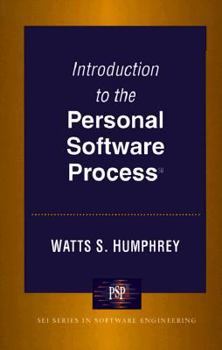Introduction to the Personal Software Process(sm)
Select Format
Select Condition 
Book Overview
One of the major challenges software engineers face transcends designing and programming software applications; it is managing their own personal approach to the software engineering process-learning... This description may be from another edition of this product.
Format:Paperback
Language:English
ISBN:0201548097
ISBN13:9780201548099
Release Date:January 1996
Publisher:Addison-Wesley Professional
Length:304 Pages
Weight:1.00 lbs.
Dimensions:0.6" x 6.3" x 9.2"
Customer Reviews
2 ratings
Measure everything, interpret carefully
Published by Thriftbooks.com User , 20 years ago
The Personal Software Process (PSP), which is a registered service mark of Carnegie Mellon University, is all about measuring and recording. Nearly everything is measured, from lines of code produced per unit time to the time spent playing/watching sports. Charts are everywhere in the book; some plot the progress of software development projects and others the weekly schedule of a college student. Therefore, there are charts that are headed "Student Y's Fixed Weekly Commitments." The initial premise of the book is that of a college student who must plan their time in order to complete all that needs to be done. Of course, the point is to emphasize that planning major projects, such as your life, requires that you set reasonable goals that are compatible with everything else that you want to do. Once the goals are set, the next step is to order your time so that all activities are allotted an appropriate time slot. The second segment deals with tracking a software development process from start to end. It is all about time, how much you expect to spend on each section and how much was actually spent. The goal is to track now so that your future projections are more accurate. With so many charts and entries, there is nothing that can be measured that does not appear somewhere in a chart. While I am a proponent of measuring and recording the significant characteristics of any project, one must take care to avoid an over reliance on the act of measuring. Even though software development is a team game, it is still very much an individual effort. There is a great deal of room for the occasional "brilliant stroke", where someone has a flash of insight into a problem that solves it in a new, unique and more efficient manner. The best programmers are still in many ways artists and regimentation can stifle their creative sides. The PSP is also different from the agile processes, which reduce the software planning cycle to a few weeks rather than a longer term. Very little is also written down in agile processes, and planning to the minute is considered counterproductive. However, even if you are a firm believer in the agile approach, reading this book will be of value. When you write down very little, you must make sure that what is written down is important, so by studying the PSP, you have a better chance of recording what is critical. Humphrey is on one end of the software development spectrum, in that he sets down a process with extensive planning. Agile processes are on the other end, where there is a minimum of planning. Most development groups will find their best location somewhere in the middle. Since the best way to find your location is to study the extremes, all software developers will find value in this book.
Good if you are a first or second year college student, but
Published by Thriftbooks.com User , 26 years ago
I originally bought this book to improve my own software engineering habits. While this book has its merits, I am afraid that it is geared more toward the first and second year college student than the professional engineer. It specifically addresses student issues, and most of the lessons are not applicable to professional work environments. However, if you happen to be a college student in CE, then I would suggest this book as a primer. Humphrey is very detailed in his explanation and extremely epxerienced in this field.






